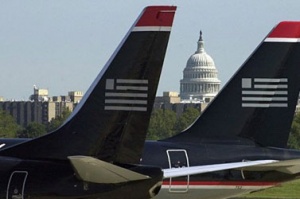US Airways ends United Airlines merger talks

Merger talks between US Airways and United Airlines (UAL) have ended, following a decision by the former to walk away from discussions.
Despite continuing to advocate consolidation in the international aviation industry, US Airways took the latest decision in the interests of its “shareholders, customers, and employees”, according to a statement.
US Airways chairman, Doug Parker, added: “We have recently held discussions with United Airlines regarding a possible combination between our two airlines.
“After an extensive review and careful consideration, our board of directors has decided to discontinue those discussions.”
The statement, following four-weeks of talks, was the first official acknowledgment by the firm it had been in discussions with UAL.
The talks were the second round of merger discussions between the firms since 2008.
“It remains our belief consolidation makes sense in an industry as fragmented as ours,” added Mr Parker.
“Whether we participate or not, consolidation that leads to a more efficient industry better able to withstand economic volatility, global competition and the cyclical nature of our industry is a positive outcome.”
UAL did not comment on the US Airways statement.
Around America
In what has been a turbulent period for the global aviation industry, American Airlines posted a greater than expected financial loss earlier this week.
In the first quarter of financial 2009 American’s net loss climbed to $505 million - some 35 per cent more than in the same period a year earlier.
[stock]LUV|1m|right|Southwest Airlines up following results[/stock]
As a result, the company lost $1.52 per share, up from $1.35 in 2009.
Excluding special items, American lost $1.36 – more then analysts expected.
Continental Airlines – which has been subject to merger speculation with American Airways – also reported losses this week.
The fourth-biggest carrier in the US reported losses excluding one-time costs of $136 million, or 98 cents a share, more than the average 86-cent loss expected by eight analyst estimates compiled by Bloomberg.
Higher jet-fuel prices raised total operating costs at each carrier, and an easing of the recession prompted businesses to resume travel.
In contrast, Southwest Airlines made $11 million in the first quarter, or a penny per share.
In a statement to markets, Southwest explained it was a modest pickup in business travel, judging from the number of people buying full-fare tickets.
Stuck on the Tarmac
Finally in US aviation, a challenge to overturn government tarmac time limits has failed.
Five American carriers had lobbied the government for exemptions from new rules which prohibit US airlines operating domestic flights from permitting a plane to remain on the tarmac at airports for more than three hours without letting passengers get off the plane.
Despite protests from JetBlue Airways, Delta Airlines, American Airlines, Continental Airlines and US Airways, US transportation secretary Ray LaHood confirmed the new rules would come into force on April 29th.
The rule only affects large and medium hub airports, and also requires passengers to be provided with working toilets and, after two hours, food and drinking water.

